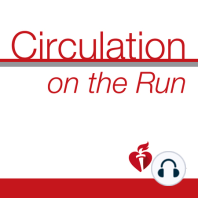17 min listen
Circulation January 2, 2019 Issue
ratings:
Length:
19 minutes
Released:
Dec 31, 2018
Format:
Podcast episode
Description
Dr Carolyn Lam: Welcome to Circulation on the run, your weekly podcast summary and back stage pass to the journal and its editors, and welcome to a whole new podcast format in 2019. Ha-ha, I bet that surprised you. Well guess what? This new format promises more interaction, more discussion and a whole lot more fun, and that's because to begin with, you don't have to listen to me talk to myself half the time anymore. I'm Dr Carolyn Lam, associate editor from the National Heart Center and Duke National University of Singapore, and I am simply delighted that Santa gave me a partner on this podcast, and co-hosted with me, and my gift is none other than Dr Greg Hundley, associate editor from the Pauley Heart Center, at Virginia Commonwealth University Health Sciences. Welcome Greg. Dr Gregory Hundley: Thank you so much Carolyn. How exciting is it to start this new year with this exciting format, where we'll take several of the key manuscripts from Circulation and discuss them? Picking five each time, and as you've alluded to, we're not going to get rid of that favorite format, where we take a select paper and interview and work with the authors. Dr Carolyn Lam: Exactly. In fact, maybe I could liken it to welcoming everyone to join us over a cup of coffee, each week, with the journal in the hand and we're just going to discuss it, and never forgetting that feature paper with the authors, and this week's paper is huge. I love it. We're actually going to be talking about blood pressure control in the barber shop. But before then, here's the articles that we've chosen to discuss. So Greg, you got your coffee ready? Shall we start? Dr Gregory Hundley: Absolutely Carolyn, and let's get going first with Gorav Ailwadi, from University of Virginia, his paper evaluating the utility of MitraClips in those with secondary mitral regurgitation. This is really a follow-up from the EVEREST study. It's not a randomized trial, but it's a longitudinal look over time, at 616 patients. Interestingly, those individuals that had class three or four heart failure, that had the MitraClip, the left ventricular volumes got smaller in a year, the hazard ratio for events became less. The magnitude of mitral regurgitation went from 4+ down to 2+. Exciting findings. Dr Carolyn Lam: Interesting, but you know Greg, these all sound so positive. Why is it so different in the Mitra FR study? Dr Gregory Hundley: Absolutely Carolyn. So, as you know, Mitra FR, that was a randomized trial. So, this study doesn't compare, the EVEREST study in this issue, doesn't compare with conventional medical therapy, that's number one, and Mitra FR did. Also, the Mitra FR patients were a little bit sicker. The ejection fraction really was 15 to 40 percent, and in the EVEREST study, much higher, average 45 percent. In fact, many had a normal EF. So it really raises a lot of questions as to whether or not this finding will hold up in future randomized trials, which we'll be looking to see the results. Dr Carolyn Lam: Indeed, and it was really nicely discussing the accompanying editorial wasn't it, which I really enjoyed. Well, the paper I picked out Greg is from Dr Gatzoulis from The Royal Brompton Hospital, and it's actually the MAESTRO trial. Now, MAESTRO is a randomized control trial of the endothelin receptor antagonist macitentan in patients with Eisenmenger syndrome. Short and long of it, macitentan did not show superiority over placebo on the primary endpoint of change in baseline to week 16 in exercise capacity. And there was also no relevant trends observed for the secondary endpoints. However, among the exploratory endpoints, macitentan did reduce Nt-proBNP in the main cohort, and improved pulmonary vascular resistant index
Released:
Dec 31, 2018
Format:
Podcast episode
Titles in the series (100)
Circulation January 24, 2017 Issue: Circulation Weekly: Your Weekly Summary & Backstage Pass To The Journal by Circulation on the Run
